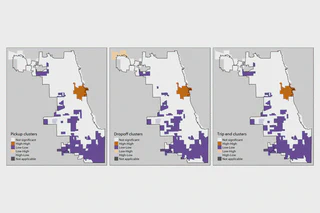Not Minding the Gap: Does Ride-Hailing Serve Transit Deserts?
 TNC trip end clusters in Chicago
TNC trip end clusters in Chicago
Abstract
Transit has long connected people to opportunities but access to transit varies greatly across space. In some cases, unevenly distributed transit supply creates gaps in service that impede travelers’ abilities to cross space and access jobs or other opportunities. With the advent of ride-hailing services like Uber and Lyft, however, travelers now have a new potential to gain automobility without high car purchase costs and in the absence of reliable transit service. Research remains mixed on whether ride-hailing serves as a modal complement or substitute to transit or whether ride-hailing fills transit service needs gaps. This study measures transit supply in Chicago and compares it to ride-hailing origins and destinations to examine if ride-hailing fills existing transit service gaps. Findings reveal clustering of ride-hailing pickups and drop-offs across the City of Chicago, but that the number of ride-hailing pickups and drop-offs was most strongly associated with high neighborhood median household income rather than measures of transit supply. In bivariate analyses, transit service was not associated with ride-hailing trip ends. But after controlling for neighborhood socioeconomic status, transit dependency, population density, and employment density, we found fewer ride-hailing trips in neighborhoods where bus service dominated and significantly more ride-hailing trips where rail service was prevalent. Patterns were slightly different for overnight weekend ride-hailing pick-ups, where higher transit density predicted a greater number of trips in nearby tracts. Additional research and policy is needed to ensure that ride-hailing services provide travel options to those who need them the most and fill transit gaps in low-income communities when options to increase service are limited.
Type
Publication
Journal of Transport Geography